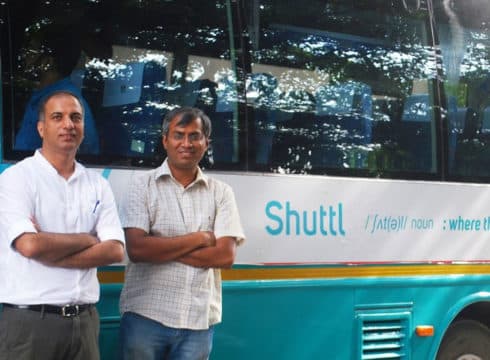Shuttl launched a pilot for on-route meal services as part of its bus service
Starting with 50, it now plans to expand meal service to its entire fleet of 1,200 buses this year
It is working with cloud kitchens and building an ordering product to scale this offering
Inc42 Daily Brief
Stay Ahead With Daily News & Analysis on India’s Tech & Startup Economy
When it comes to providing onboard meal services to travellers, no one can compete with the Indian Railways and airlines in the country. And their services have improved over time with private players such as RailRestro, TravelKhana, and Travel Food Services supporting them with technology. Gurugram-based bus aggregator platform Shuttl is now looking to bring the same convenience to daily office commuters through its bus aggregator platform.
Targeting users who use Shuttl services at least 22 times a month on an average, the startup is offering breakfast and snacks to its customers during the ride. It has launched a pilot, offering its meal service on 50 buses and now plans to expand its meal service to its entire fleet of 1,200 buses this year.
Meal Service: Assessing The Demand-Supply Matrix
The data shared by Shuttl reveals that 90% people travelling on its fleet of buses during the pilot mode bought food items during bus rides, which validates that there is a consumer demand for the meal service.
Amit Singh, cofounder of Shuttl, said in a media statement: “We are working with cloud kitchens and building an ordering product to scale this offering.”
According to a 2017 FICCI-Foodzania report in partnership with research firm Technopak, the Indian food services market in India (organised and unorganised) is estimated at INR 3,37,500 Cr in 2017 and is projected to grow at a CAGR of 10% over the next five years to reach INR 5,52,000 Cr by 2022.
This growth is fuelled by the rising young, working population, which is well travelled, includes couples with double incomes, and is experimental, along with being tech-savvy. This cross-section of young Indians also eats out a lot more than their predecessors.
To cater to this demand, organised food services companies offering quick service restaurants (QSR), cloud kitchens, ready-to-eat food (like cup noodles and meals), etc, are filling in the supply gaps. Not to forget, adoption of contactless payment modes such as digital wallets and improved logistics has further opened up the doors for quick service and on-the-go meal services.
What Shuttl Is Counting On?
Shuttl, launched in 2015 by Amit Singh and Deepanshu Malviya, offers an app-based office shuttle service across major cities such as Kolkata, Hyderabad, Pune, Mumbai, Delhi-NCR, Bengaluru, Chennai, and Jaipur. Shuttl allows its users to book buses by choosing the pick up and drop point through its app.
The startup is among the few players that were able to stay afloat in this segment considering the difficulties in route mapping, deciding on the frequency of buses, building trusted driver fleets as well as regulatory scrutiny around the business model. Even cab aggregator Ola, which started a shuttle service in 2015, had to shut it down last year.
“Now we are in the growth phase. About 30% of our customers take more than 30 rides in a month…such high frequency is unprecedented in the transaction internet businesses,” said Singh. The startup claims to provides 60K rides per day and has 80% of its business coming from Delhi/ NCR.
Shuttl’s existing business model is now generating revenues (INR 53 Cr in FY17) and is well supported by investors like Trifecta Capital, Amazon’s Alexa Fund, Dentsu Ventures, Sequoia Capital India, Times Internet, Lightspeed Venture Partners, and AdvantEdge Partners.
Going ahead, the company plans to enter the micro-delivery segment, wherein it is looking to offer daily commuters an option to buy daily essentials like bread, butter, curd, eggs, and milk on buses. Also, it expects to break even at an operating level on basis of factors such as an increase in ticket prices, bigger buses, and improved occupancy levels.
At a time when online buying has become the new normal, Shuttl is diversifying into something completely different with its onboard meal service. It is among the first startups in the daily-commute industry of its kind to experiment with this offline market.
And in the millennial age of long working hours and commutes, Shuttl’s experiment seems to have huge potential. But how it fits the expectations of its customers, maintains food standards and finds ways to offers subscriptions or discounts to attract commuters to its meal service are critical to its success.
[The story has been written with inputs from Meha Agarwal]
{{#name}}{{name}}{{/name}}{{^name}}-{{/name}}
{{#description}}{{description}}...{{/description}}{{^description}}-{{/description}}
Note: We at Inc42 take our ethics very seriously. More information about it can be found here.


